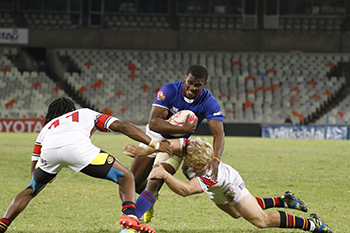Latest News Archive
Please select Category, Year, and then Month to display items
10 March 2022
|
Story Anthony Mthembu
|
Photo Unsplash
 The No Student Hungry team gearing up to start distributing food parcels to the selected students.
The No Student Hungry team gearing up to start distributing food parcels to the selected students.
The UFS is one of the many institutions of higher learning where food insecurity is an active issue. However, the
No Student Hungry Programme is one of the initiatives launched at the university to assist in fighting food insecurity at the institution.
The purpose of the programme
Since its inception in 2011, the initiative has assisted many students in acquiring a healthy meal. Additionally, the Food Environment Office also hands out food packages, so that students can continue to achieve academically. “We are trying to develop a healthy environment for students and make it easier for them to have a nice and healthy meal,” stated Annelize Visagie, who heads the Food Environment Office at the UFS. The Food Environment programme is spread out on all three campuses, each with its own facilitators. Furthermore, the programme mainly caters for students who are not funded by the National Student Financial Aid Scheme (NSFAS) but who are excelling academically. The abovementioned students apply for assistance online, and a list is then drawn up of students who receive assistance for the year.
Alternative solutions to keep the initiative running
On the Bloemfontein Campus, the No Student Hungry Programme will be catering for 200 students in the 2022 academic year, assisting them with a daily nutritious meal. Additional food parcels are also handed out to provide further assistance. “We give food parcels to the students on the list every Tuesday and Thursday at the Thakaneng Bridge,” Visagie highlighted. However, she argues that catering for the student population through this programme can be a challenge, as the demand for assistance is growing rapidly and the ability to assist is limited. The programme relies on partnerships and sponsors to assist the student body. In fact, the coordinators of the programme currently have a memorandum of understanding with Tiger Brands according to which they deliver around 100 food parcels for distribution.
In addition, the coordinators have put in place alternative measures to ensure that they can provide more food to students. “The
Kovsie Act Office, in partnership with the
Department of Sustainable Food Systems and Development, has started a food garden where healthy and nutritious produce are grown, in order to add value to the distribution,” she indicated. Although the programme can only assist to a point, students who are in desperate need of assistance are never turned away. In fact, the
Social Support Unit at Thakaneng Bridge usually assists students with food vouchers for a maximum of four days.
A commitment to teaching healthy eating habits
The programme is not only committed to curbing food insecurity, but also to ensuring that students have a healthy and balanced diet. As such, a booklet is being issued by the
Department of Nutrition and Dietetics in collaboration with the Department of Sustainable Food Systems and Development, which contains ways in which students can make a healthy meal using some of the ingredients offered in the food parcels.
“We want to teach students how to eat healthy in the cheapest way, because they don’t have a lot of money to buy expensive food products,” Visagie argued.
Young Shimla team reach Varsity Cup semi-final
2017-03-29

The Shimlas will be hoping that some of their stars,
like the brilliant flanker Phumzile Maqondwana, will be
on form in the 2017 Varsity Cup semi-final against
Tuks in Pretoria.
Photo: Johan Roux
The pressure in the Varsity Cup semi-final is on Tuks, which will be reason enough for Shimlas to play with freedom.
This is according to Jaco Swanepoel, Shimla assistant coach, on the big challenge awaiting his young rugby team in Pretoria on 3 April 2017. He says because Tuks are the favourites, it could be to the advantage of the visitors. Maties and the University of Johannesburg are playing in the other semi-final in Stellenbosch on the same day.
Tuks did Shimlas a favour
Tuks’ victory of 43-28 over the Pukke in Potchefstroom on 27 March 2017 helped the Shimlas, who had a bye, to end fourth on the log with 23 league points.
Shimlas had to make use of several new players this year, and few experts would have given them a chance of reaching the semi-finals. Swanepoel says although they are proud of this achievement, only a place among the top four was never their end-goal.
Good to be the underdog
The Shimlas lost their league match against Tuks in Bloemfontein with 19-65. This, as well as the fact that Tuks was at the top of the log with 34 league points, underlines the huge task ahead.
“The previous result (against Tuks) is encouragement for the players to show: We aren’t that much worse than Tuks,” says Swanepoel. “Perhaps it is good to be the underdog. We actually have no pressure on us and I hope the players feel the same way.”
Three teams in knockout matches
All three Varsity Cup teams from the University of the Free State (UFS) reached the knockout matches. Apart from Shimlas, the UFS Young Guns played against Tuks in a semi-final in Bloemfontein on 27 March 2017, but lost by 21-45. On 17 April 2017, Vishuis will meet the Puk’s Patria in the residence finals.